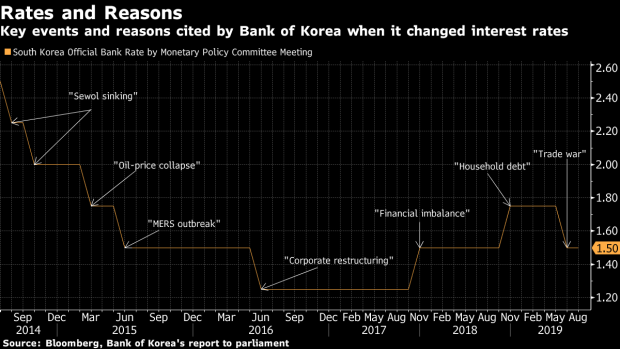Oct 15, 2019
Bank of Korea Is Expected to Cut Rates as Prices Fall
, Bloomberg News

(Bloomberg) -- South Korea’s first-ever drop in consumer prices and a relentless decline in exports are adding to the case for the central bank to cut interest rates on Wednesday.
The Bank of Korea, which lowered its key rate in July and left it unchanged in August, will reduce the seven-day repurchase rate by 25 basis points to 1.25%, matching an all-time low, according to 21 of 25 economists surveyed by Bloomberg. The rest expect the BOK to stand pat.
Central banks around the world are unleashing stimulus to shore up growth as the U.S.-China trade war takes a toll on global demand. Singapore eased monetary policy for the first time since 2016 on Monday joining Australia and India in ramping up stimulus this month, while the Federal Reserve may be gearing up for another rate cut at the end of October.
South Korea’s export-dependent economy has been among the hardest-hit from trade tensions, with weakness in demand contributing to a drop in prices that has spurred concerns over deflation risks.
“The BOK will probably ease as early as possible,” said Jeong Won-il, an economist at Yuanta Securities. “A global easing in monetary policy is also creating an environment conducive for the BOK to act.”
South Korea’s inflation was zero in August and fell to minus 0.4% in September. Officials have downplayed the risk of the economy falling into a prolonged bout of deflation, characterizing the recent drop as a statistical blip stemming from higher-than-usual food prices a year earlier. Nonetheless, consumer prices decreasing in a country that serves as a bellwether for world trade is a warning for other export-driven economies.
BOK Governor Lee Ju-yeol has said repeatedly in the past few weeks that it will be difficult for the economy to achieve 2.2% growth this year, as forecast in July. He has cited the trade dispute between the U.S. and China, along with global demand for memory chip exports, as the most important factors impacting South Korean economy. Exports fell for a tenth month in September, weighing on companies’ investment and hiring.
If the cut is delivered on Wednesday as expected, the focus in the market will quickly turn to the extent of easing in this cycle. Analysts are split on the next step after a reduction to 1.25%, with some seeing a hold throughout 2020, and others seeing a cut to 1% or even to 0.75%.
The BOK’s focus on keeping its lower bound of interest rates higher than other developed countries indicates the hurdle for additional cuts will be high, according to Krystal Tan, an economist at Australia & New Zealand Banking Group Ltd.
“It would take an even sharper deterioration in South Korea’s growth outlook for the central bank to consider pushing its policy rate to a new record low,” Tan wrote in a report.
The financial risks from cheaper borrowing costs for a country with high levels of household debt remain a concern for the central bank as does the possibility of sharp capital outflows.
South Korea’s won has dropped 5.9% against the dollar this year, making it the worst performing currency in Asia. While won weakness is often regarded as positive for export competitiveness, a rapid depreciation heightens concerns over financial market stability and capital outflows.
Trade Winds
A key consideration in Korea’s economic outlook and monetary policy would be how the U.S.-China trade war pans out. While the two have worked out a “phase one” deal, it’s too early to see it as light at the end of a tunnel, economists say.
“The temporary truce does not clear the cloud of trade policy uncertainty that has been affecting the global economy,” Citigroup economists Cesar Rojas and Catherine Mann wrote in a report. “Uncertainty is likely to continue to have an impact on investment plans.”
The bank’s policy announcement typically comes around 10 a.m. in Seoul, followed by a written assessment of the economy and inflation. Lee provides details in a press briefing from around 11:20 a.m.
What Bloomberg’s Economists Say
“A rate cut in October would bring the benchmark rate back to its record low. Concerns about financial imbalances mean the central bank may need to exercise extra caution before cutting further.”
--Justin Jimenez, associate
Click here to read more.
--With assistance from Hooyeon Kim.
To contact the reporter on this story: Sam Kim in Seoul at skim609@bloomberg.net
To contact the editors responsible for this story: Malcolm Scott at mscott23@bloomberg.net, Jiyeun Lee, Paul Jackson
©2019 Bloomberg L.P.





